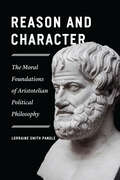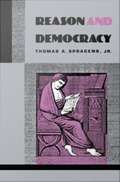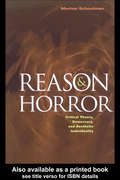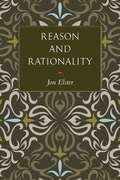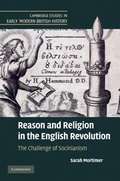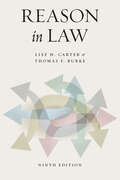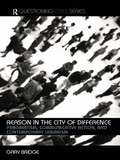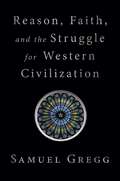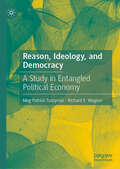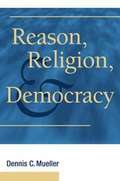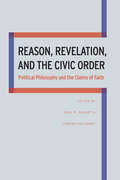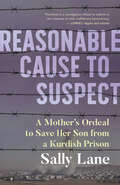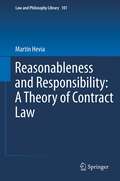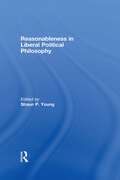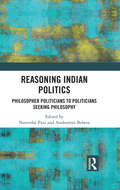- Table View
- List View
Reason and Character: The Moral Foundations of Aristotelian Political Philosophy
by Lorraine Smith PangleWhat does it mean to live a good life or a happy life, and what part does reason play in the quest for fulfillment? Proceeding by means of a close and thematically selective commentary on Aristotle’s Nicomachean Ethics, this book offers a novel interpretation of Aristotle’s teachings on the relation between reason and moral virtue. Pangle shows how Aristotle’s arguments for virtue as the core of happiness and for reason as the guide to virtue emerge in dialectical response to Socrates’s paradoxical claim that virtue is knowledge and vice is ignorance, and as part of a politically complex project of giving guidance to lawgivers and ordinary citizens while offering spurs to deep theoretical reflection. Against Socrates, Aristotle insists that both virtue and vice are voluntary and that individuals are responsible for their characters, a stance that lends itself to vigorous defense of moral responsibility. At the same time, Pangle shows, Aristotle elucidates the importance of unchosen concerns in shaping all that we do and the presence of some form of ignorance or subtle confusions in all moral failings. Thus the gap between his position and that of Socrates comes on close inspection to be much smaller than first appears, and his true teaching on the role of reason in shaping moral existence far more complex. The book offers fresh interpretations of Aristotle’s teaching on the relation of passions to judgments, on what it means to choose virtue for its own sake, on the way reason finds the mean, especially in justice, and on the crucial intellectual virtue of phronesis or active wisdom and its relation to theoretical wisdom. Offering answers to longstanding debates over the status of reason and the meaning of happiness in the Nicomachean Ethics, this book will kindle in readers a new appreciation for Aristotle’s lessons on how to make the most out of life, as individuals and in society.
Reason and Democracy
by Thomas A. Spragens Jr.Reason and Democracy breaks new ground in providing a plausible philosophical basis for the communitarian view of a healthy democracy as the rational pursuit of common purposes by free and equal citizens. Thomas A. Spragens Jr. argues that the most persistent paradigms of Western political rationality originated in classical philosophy, took their modern expression in the philosophies of Kant and Mill, and terminated in Max Weber's pairing of purely technical rationality with arbitrary ends. Drawing on recent work in the philosophy of science and the philosophy of language, combined with appropriate analogies in political thought and action, Spragens maintains that it is possible to discern the outlines of a philosophically cogent and morally beneficial concept of rational practice on the part of a political community. This possibility, he contends, provides a philosophical basis for liberal democratic politics that is superior to utilitarian and deontological accounts.
Reason and Horror: Critical Theory, Democracy and Aesthetic Individuality
by Morton SchoolmanMorton Schoolman develops a fascinating and entirely new interpretation of the work of Horkenheimer and Adorno.
Reason and Imagination: Studies in the History of Ideas 1600-1800 (Routledge Revivals)
by Mark E. ByrnesFirst published in 1962, Reason and Imagination presents collection of fourteen essays dedicated to Marjorie Hope Nicholson and is divided equally between works of her colleagues and of her former students. It contains themes like noble numbers and poetry of devotion, Cromwell as Davidic King, the isolation of the renaissances hero, Milton’s dialogue on Astronomy, music, mirth and galenic traditions in England, the Augustan conception of history, Locke and Sterne, and literary criticism and artistic interpretation, to weave a narrative of the history of ideas in the seventeenth and eighteenth century. This book will be an essential read for scholars and researchers of literary history, philosophy, comparative literature, and English literature in general.
Reason and Rationality
by Jon ElsterOne of the world's most important political philosophers, Jon Elster is a leading thinker on reason and rationality and their roles in politics and public life. In this short book, he crystallizes and advances his work, bridging the gap between philosophers who use the idea of reason to assess human behavior from a normative point of view and social scientists who use the idea of rationality to explain behavior. In place of these approaches, Elster proposes a unified conceptual framework for the study of behavior. Drawing on classical moralists as well as modern scholarship, and using a wealth of historical and contemporary illustrations, Reason and Rationality marks a new development in Elster's thinking while at the same time providing a brief, elegant, and accessible introduction to his work.
Reason and Religion in the English Revolution
by Sarah MortimerThis book provides a significant rereading of political and ecclesiastical developments during the English Revolution, by integrating them into broader European discussions about Christianity and civil society. Sarah Mortimer reveals the extent to which these discussions were shaped by the writing of the Socinians, an extremely influential group of heterodox writers. She provides the first treatment of Socinianism in England for over fifty years, demonstrating the interplay between theological ideas and political events in this period as well as the strong intellectual connections between England and Europe. Royalists used Socinian ideas to defend royal authority and the episcopal Church of England - from both Parliamentarians and Thomas Hobbes. But Socinianism was also vigorously denounced and, after the civil wars, this attack on Socinianism was central to efforts to build a church under Cromwell and to provide toleration. The final chapters provide a new account of the religious settlement of the 1650s.
Reason and Revelation before Historicism
by Sharon Jo PortnoffCan contemporary religion, and particularly Judaism, exist without being informed by history? This question was debated in 1940s New York by two German refugees who later rose to prominence -- Leo Strauss, one of the twentieth century's most significant political philosophers, and Emil L. Fackenheim, an important post-Holocaust Jewish theologian. There has been little consensus, however, on the definitive meaning of their work.Reason and Revelation before Historicism, the first full-length comparison of Strauss and Fackenheim,places the informal teacher and student in conversation alongside sections of their analyses of notable thinkers. Sharon Portnoff suggests that both saw historicism as the nexus of the intersection and tension between philosophy and religion and raised the possibility of the persistence of the permanent in the modern world. Portnoff illuminates our understanding of Strauss's relationship with Judaism, Fackenheim's oft-overshadowed great philosophical depth, and the function and character of Jewish thought in a secular, post-Holocaust world.
Reason in Law: Ninth Edition
by Lief H. Carter Thomas F. BurkeOver the nearly four decades it has been in print, Reason in Law has established itself as the place to start for understanding legal reasoning, a critical component of the rule of law. This ninth edition brings the book's analyses and examples up to date, adding new cases while retaining old ones whose lessons remain potent. It examines several recent controversial Supreme Court decisions, including rulings on the constitutionality and proper interpretation of the Affordable Care Act and Justice Scalia's powerful dissent in Maryland v. King. Also new to this edition are cases on same-sex marriage, the Voting Rights Act, and the legalization of marijuana. A new appendix explains the historical evolution of legal reasoning and the rule of law in civic life. The result is an indispensable introduction to the workings of the law.
Reason in the City of Difference (Questioning Cities)
by Gary BridgeIn the modernist city rationality ruled and subsumed difference in a logic of identity. In the postmodern city, reason is abandoned for an endless play of difference. Reason in the City of Difference poses an alternative to these extremes by drawing on classical American philosophical pragmatism (and its contemporary developments in feminism and the philosophy of communication) to explore the possibilities of a strengthening and deepening of reason in the contemporary city. This is a transactional rationality based on communication, rather than cognition, involving bodies as much as minds, and non-discursive, as well as discursive competences. It is a rationality that emerges out of difference and from within the city, rather than over and above it. Using pragmatist philosophy and a range of suggestive examples of urban scholarship, this fascinating book offers a new, alternative reading of the city.
Reason of State
by Thomas PooleThis historically embedded treatment of theoretical debates about prerogative and reason of state spans over four centuries of constitutional development. Commencing with the English Civil War and the constitutional theories of Hobbes and the Republicans, it moves through eighteenth-century arguments over jealousy of trade and commercial reason of state to early imperial concerns and the nineteenth-century debate on the legislative empire, to martial law and twentieth-century articulations of the state at the end of empire. It concludes with reflections on the contemporary post-imperial security state. The book synthesises a wealth of theoretical and empirical literature that allows a link to be made between the development of constitutional ideas and global realpolitik. It exposes the relationship between internal and external pressures and designs in the making of the modern constitutional polity and explores the relationship between law, politics and economics in a way that remains rare in constitutional scholarship.
Reason, Faith, and the Struggle for Western Civilization
by Samuel Gregg"Gregg's book is the closet thing I've encountered in a long time to a one-volume user's manual for operarting Western Civilization." —The Stream The genius of Western civilization is its unique synthesis of reason and faith. But today that synthesis is under attack—from the East by radical Islam (faith without reason) and from within the West itself by aggressive secularism (reason without faith). The stakes are incalculably high. The naïve and increasingly common assumption that reason and faith are incompatible is simply at odds with the facts of history. The revelation in the Hebrew Scriptures of a reasonable Creator imbued Judaism and Christianity with a conviction that the world is intelligible, leading to the flowering of reason and the invention of science in the West. It was no accident that the Enlightenment took place in the culture formed by the Jewish and Christian faiths. We can all see that faith without reason is benighted at best, fanatical and violent at worst. But too many forget that reason, stripped of faith, is subject to its own pathologies. A supposedly autonomous reason easily sinks into fanaticism, stifling dissent as bigoted and irrational and devouring the humane civilization fostered by the integration of reason and faith. The blood-soaked history of the twentieth century attests to the totalitarian forces unleashed by corrupted reason. But Samuel Gregg does more than lament the intellectual and spiritual ruin caused by the divorce of reason and faith. He shows that each of these foundational principles corrects the other’s excesses and enhances our comprehension of the truth in a continuous renewal of civilization. By recovering this balance, we can avoid a suicidal winner-take-all conflict between reason and faith and a future that will respect neither.
Reason, Ideology, and Democracy: A Study in Entangled Political Economy
by Richard E. Wagner Meg Patrick TuszynskiDemocratic political systems are often thought to be preferable to all others for supporting liberty. Around the world, nations that are more democratic tend to be freer across various aspects of life and human experience. This book undertakes a social scientific analysis of this claim and finds it to be wanting. The reality of democratic systems does not adhere to popular rhetoric. One of the key reasons for this is that our system is an entangled system, one in which the realm of the political and commercial are so intertwined that they cannot be easily separated. Businessmen have political interests, and politicians have commercial interests. The implication of this entanglement is that alleviating the problems that emerge in democratic systems is not a simple matter of rolling back damaging interventions. Due to the logic of entanglement, returning to a “free market” is not possible in most cases. The authors pull economics back to its classical roots to analyze the social orders that best allow people to live together. The world is not constantly aiming at placidity, as the prevailing economics of equilibrium would have us think. We live in a world of change and turbulence, so our social science requires a framework that deals with this turbulence robustly. Classical economists beginning with Adam Smith sought to uncover which forms of human association allowed us to live better together. The authors explain Smith’s observations, asking the same sorts of questions of readers today. Because the baseline assumption of entanglement does not allow one to divide the world so clearly into two distinct structures, the authors parallel Smith’s approach, focusing on forms of association rather than political or commercial structures. Focusing on human association, the authors help readers uncover the manifold structures humans have devised that allow them to tame the turbulence and live lives more harmoniously with others.
Reason, Religion, and Democracy
by Dennis C. MuellerThe rise of religious fundamentalism in different parts of the world in recent years and its association with terrorism has led to renewed interest in the nature of religion and its compatibility with Western institutions. Much of the focus of this new interest has contrasted religion and science as systems of knowledge. This book also emphasizes the difference between religion and science as means for understanding causal relationships, but it focuses much more heavily on the challenge religious extremism poses for liberal democratic institutions. The treatment contains a discussion of human psychology, describes the salient characteristics of all religions, and contrasts religion and science as systems of thought. Historical sketches are used to establish a link between modernity and the use of the human capacity for reasoning to advance human welfare. The book describes the conditions under which democratic institutions can advance human welfare, and the nature of constitutional rights as protectors of individual freedoms. Extremist religions are shown to pose a threat to liberal democracy, a threat that has implications for immigration and education policies and the definition of citizenship.
Reason, Revelation and Law in Islamic and Western Theory and History (Islam and Global Studies)
by R. Charles Weller Anver M. EmonThis book engages the diverse meanings and interpretations of Islamic and Western law which have affected people and societies across the globe, past and present, in correlation to the epistemological groundings of those meanings and interpretations. The volume takes a distinctively comparative approach, advancing dialogue on crucial transnational and global debates over the history of Western and Islamic approaches to law, politics and society and their relevance for today. It discusses how fundamental concepts are understood and even translated from one historical or political context or one semantic domain to another. The book provides focused studies of key figures and theories in a manageable, accessible format useful for specialized academic courses and research as well as general audiences.
Reason, Revelation, and the Civic Order: Political Philosophy and the Claims of Faith
by Carson HollowayWhile the dominant approaches to the current study of political philosophy are various, with some friendlier to religious belief than others, almost all place constraints on the philosophic and political role of revelation. Mainstream secular political theorists do not entirely disregard religion. But to the extent that they pay attention, their treatment of religious belief is seen more as a political or philosophic problem to be addressed rather than as a positive body of thought from which we might derive important insights about the nature of politics and the truth of the human condition. In a one-of-a-kind collection, DeHart and Holloway bring together leading scholars from various fields, including political science, philosophy, and theology, to challenge the prevailing orthodoxy and to demonstrate the role that religion can and does play in political life. Contributing authors include such important thinkers as Peter Augustine Lawler, Robert C. Koons, J. Budziszewski, Francis J. Beckwith, and James Stoner.
Reason: Why Liberals Will Win the Battle for America
by Robert B. ReichFrom Robert B. Reich, passionate believer in American democracy, and public servant in both Democratic and Republican administrations--an urgent call to liberals to reclaim their political clout. Reason is a guide to confronting and derailing what he sees as the mounting threat to American liberty, prosperity, and security posed by the radical conservatives--Radcons, as he calls them--whose agenda has dominated public discourse and radically affected government action since the election, by a minority vote, of George W. Bush. It is an agenda that turns American tradition upside down-embracing "preemptive" war, disrupting essential alliances, reacting to terrorism by weakening our civil liberties, distorting our economy by endowing the rich with tax breaks while cutting social services, attempting to hunt down immorality in bedrooms rather than in boardrooms, where corporate malfeasance is still not legally prevented from chomping away at ordinary American earnings. Reich offers a bold plan for defeating this politics of fear and favor-whose defining gesture is to equate dissent with treason-and for reinstating the traditional American politics of reason. He calls on liberals to close ranks and maintain a permanent platform that can grow in power. He provides clear answers to the barrage of accusations (of communism, of elitism, of anti-Americanism) with which Radcons have been pummeling liberals for at least two decades. He analyzes the propaganda savvy, the commitment, and the organization of the Radcons, and what liberals can learn from each. He suggests how liberals can wrest the sole ownership of patriotism from the Radcons-there's more to it than flag waving. He calls on liberals to recognize their strengths. He wants them to remember their unfaltering protection of the central American invention: a society (ours was the first in history) that allows no aristocracy and hence belongs to all its citizens. And he wants liberals to recall how, twice in the last century, liberalism's dedicated reforms rescued American free enterprise from its own excesses: first from the robber barons in the early 1900s, then in the depression-devastated 1930s. He demonstrates, with quotations from the most respected opinion polls, how far the radical conservative agenda is from representing the national will. And he tells why he believes that once again-assuming the readiness to take action-American liberals are on the verge of winning the battle for America.
Reasonable Cause to Suspect: A Mother's Ordeal to Free Her Son from a Kurdish Prison
by Sally LaneIn a story of deceit, betrayal, and injustice, two parents are tried as terrorists for attempting to rescue their son from a Syrian war zone.On September 2, 2014, Jack Letts, an idealistic eighteen-year-old British Canadian, phoned his mother saying, “Mum, I’m in Syria.” Those chilling words from a raging war zone set in train his family’s eight-year-long battle to rescue Jack from his disastrous mistake.When an unscrupulous journalist invented the term “Jihadi Jack,” a false image of Jack spread throughout the world. Sally and John, Jack’s parents, faced the mammoth task of persuading a hostile public that their son was the victim of a smear campaign. He should, they argued, at least be allowed home to face a fair trial to address the claims against him. But the Canadian and British governments had other plans. Jack is currently detained in a Kurdish prison, while the Canadian government claims it doesn’t know if he is alive or dead. This is his parents’ story of their painful struggle to persuade the world to save the son they love.
Reasonable Disagreement: A Theory of Political Morality
by Christopher McmahonThis book examines the ways in which reasonable people can disagree about the requirements of political morality. Christopher McMahon argues that there will be a 'zone of reasonable disagreement' surrounding most questions of political morality. Moral notions of right and wrong evolve over time as new zones of reasonable disagreement emerge out of old ones; thus political morality is both different in different societies with varying histories, and different now from what it was in the past. McMahon explores this feature of his theory in detail and traces its implications for the possibility of making moral judgments about other polities, past or present. His study sheds light on an important and often overlooked aspect of political life, and will be of interest to a wide range of readers in moral and political philosophy and in political theory.
Reasonable Disagreement: Two U.S. Senators and the Choices They Make (Politics and Policy in American Institutions #Vol. 2)
by Karl A. LambThis book examines the frequent reasonable disagreements of U.S. senators Paul Sarbanes and Dick Lugar, and finds in aspects of their life experiences reasons why they take particular positions and cast specific votes.
Reasonableness and Fairness
by Christopher McmahonWe all know, or think we know, what it means to say that something is 'reasonable' or 'fair', but what exactly are these concepts and how have they evolved and changed over the course of history? In this book, Christopher McMahon explores reasonableness, fairness, and justice as central concepts of the morality of reciprocal concern. He argues that the basis of this morality evolves as history unfolds, so that forms of interaction that might have been morally acceptable in the past are judged unacceptable today. The first part of his study examines the notions of reasonableness and fairness as they are employed in ordinary practical thought, and the second part develops a constructivist theory to explain why and how this part of morality can undergo historical development without arriving at any final form. His book will interest scholars of ethics, political theory, and the history of ideas.
Reasonableness and Responsibility: A Theory of Contract Law
by Martín HeviaIf, as John Rawls famously suggests, justice is the first virtue of social institutions, how are we to understand the institution of contract law? This book proposes a Rawlsian theory of contract law. It argues that justice requires that we understand contract rules in terms of the idea of reasonable, terms of interaction - that is, terms that would be accepted by reasonable persons moved by a desire for a social world in which they, as free and equal, can cooperate with others on terms they accept. On that basis, the book explains the main doctrines of contract law, including those governing third parties, in both the Common Law and the Civil Law.
Reasonableness in Liberal Political Philosophy
by Shaun P. YoungPreviously published as a special issue of the Critical Review of Social and Political Philosophy, this collection offers a thought-provoking critique of the role of the concept of reasonableness in liberal political theory, focusing on the proposed relationship between reasonableness and the establishment and preservation of a just and stable liberal polity.The essays explore the explicit and implicit use of the idea of reasonableness, presenting an analysis that incorporates normative and empirical observations and employs a number of different analytical approaches, including liberalism, feminism, environmentalism, Marxism, and communitarianism. This unique book provides in a single volume a critique that engages not only a vast array of issues but also a diversity of critical perspectives. It not only rectifies a deficiency in the existing scholarship, but also addresses the issues of socio-political justice and stability, offering new, insightful critiques that respond to the increasingly complex circumstances and conflicts that confront life in contemporary pluralistic societies. Reasonableness in Liberal Political Philosophy will be a valuable resource for those interested in liberal political theory and its potential usefulness in helping to secure a just and stable polity.
Reasoning Indian Politics: Philosopher Politicians to Politicians Seeking Philosophy
by Narendar Pani Anshuman BeheraThis volume examines the multiple forms of reasoning in Indian politics and explores a framework to understand them. In the process, it looks at a series of issues involving the relationship between politics and philosophy, including the status of political theory, political practices, identity politics, and political ontology. The book argues that in the years leading up to and soon after independence, the task of conceptualizing politics was largely in the domain of practising politicians who built theories and philosophical methods, and further took those visions into the practice of their politics. It maintains that Indian politicians since then have not been as inclined to articulate their theories or methods of politics. This book traces the transition from philosopher politicians to politicians seeking philosophy in Indian polity in the post-independence era and its implications for current practices. It views Indian political philosophy from the standpoints of political theorists, philosophers, and practitioners. With expert and scholarly contributions, this volume will be of interest to students and researchers of Indian political thought and political philosophy, social sciences, and humanities.
Reasoning Unbound: Thinking about Morality, Delusion and Democracy
by Jean-François BonnefonThis book argues that the science of reasoning will prove most useful if focused on studying what human reasoning does best - understanding people. Bonnefon argues that humanity's unique reasoning abilities developed in order to handle the complexities of cooperative social life. Accordingly, human beings became exquisite students of the minds of other people to predict the kind of decisions they make, and assess their character. In particular, this volume explores the inferences humans make about the moral character of others, how they delude themselves about their own moral character, and the ways in which they can see through the delusions of others. In conclusion, the book considers how to leverage the power of human reasoning in order to sustain democratic life. This work will interest scholars and students working in fields including theory of mind, decision-making, moral cognition, critical thinking, experimental philosophy, and behavioural economics, as well as policy makers interested in how reasoning impacts our political understanding.
Reasoning from Race: Feminism, Law, and the Civil Rights Revolution
by Serena MayeriIn the 1960s and 1970s, analogies between sex discrimination and racial injustice became potent weapons in the battle for women s rights, as feminists borrowed rhetoric and legal arguments from the civil rights movement. Serena Mayeri s Reasoning from Race is the first history of this key strategy and its consequences for American law.
